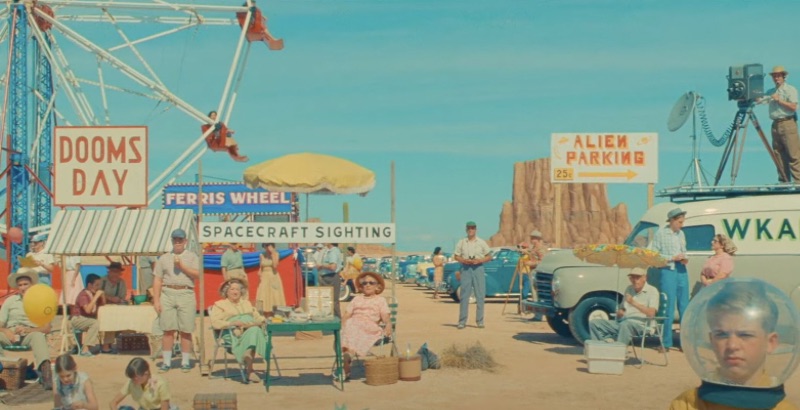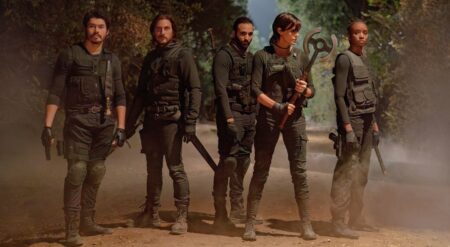
In 1955 America, a wide variety of people make it to Asteroid City, a desert town, for an initially unsuspecting visit to a Junior Stargazer competition. While the various characters deal with their personal struggles, unexpected events occur that put everyone through more than they bargained for. Asteroid City stars an ensemble cast of Jason Schwartzman, Scarlett Johansson, Tom Hanks, Jeffrey Wright, Tilda Swinton, Bryan Cranston, Edward Norton, Adrien Brody, Liev Schreiber, Hope Davis, Steve Park, Rupert Friend, Maya Hawke, Steve Carell, Matt Dillon, Hong Chau, Willem Dafoe, Tony Revolori, Jake Ryan, Jeff Goldblum, Sophia Lillis, and Margot Robbie. Wes Anderson is the writer and director, with story co-written by Roman Coppola. The producers are American Empirical Pictures and Indian Paintbrush, and Focus Features is the distributor.
Wes Anderson is a director with a distinct visual and storytelling style. That said, Asteroid City fails to amount to more than the sum of its parts. This is in part due to the the sheer amount of narrative Anderson attempts to include, resulting in a film that’s more muddled than focused. While there are some strong moments of heartfelt connections, Anderson makes the frustrating decision to jerk us away from these substantial character moments to force in unclear and unfocused meta-commentary. Even with the good parts of this film, it’s the jerking away from them that makes this a frustrating and sometimes tedious watch. In the end, without giving too much away, Asteroid City ends up collapsing in on itself due to its director’s insistence on surrealism, as it closes out with a confusing ending that doesn’t allow much resolution.
Schwartzman and Johansson have fantastic chemistry and rapport as two wounded single parents discover a shared bond. Hanks is a gruff grandpa with a heart of gold who cares for his family. Swinton is great as an astronomer aiming for genuine exploration, while Wright is a belligerent general who would rather destroy than explore. Hawke is fantastic as a religious teacher who comes to soften as she meets the cowboy played by Friend. Ryan is excellent as the oldest son of his family aiming to make sense of his mother’s (Margot Robbie) untimely death. Everyone brings their A-game in terms of performances but the busy script by Anderson never allows them to coalesce.
There was so much potential for commentary on a variety of issues with these performances, but without a consistent script that dared to say anything substantial, there’s not much to be left with. With greater story-focused direction, this could have potentially been one of Anderson’s best films.
Thankfully though, the film is visually engaging throughout, as one would expect from a Wes Anderson flick. There’s such rich use of colors that pop as they stand against the desert background. The camerawork is dynamic and mostly easily transitions between Anderson’s various scenes. The changing in lighting is particularly sound and sets the mood perfectly for different scenes. Visually, along with solid performances, are where Asteroid City truly shines.
Anderson is what gets in the way of Asteroid City‘s success as a narrative. The writer-director’s insistence on meta commentary results in what could have been one of his most ambitious and groundbreaking films that instead collapses into a narrative mess. Thankfully, the solid performances from the ensemble cast and Anderson’s penchant for great visuals keep it from being a complete disaster and makes for some enjoyable time while watching. The disappointment stems from how much more the film could’ve been, as Anderson was way more focused on bucking reasonable standards of storytelling for the sake of his unique take. At some point, you must tell a coherent and compelling story with a greater message, and I remain confused about what Asteroid City set out to say.
Asteroid City will have a limited theatrical release June 16, and then a wider release June 23.
Asteroid City
-
Rating - 5/105/10
TL;DR
What gets in the way of Asteroid City‘s success as a narrative was Anderson himself. The writer-director’s insistence on meta commentary results in what could have been one of his most ambitious and groundbreaking films that instead collapses into a narrative mess.






